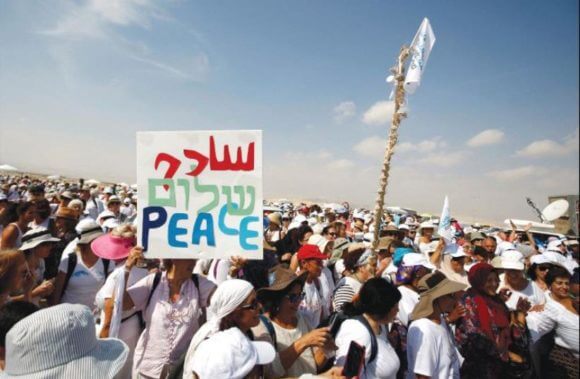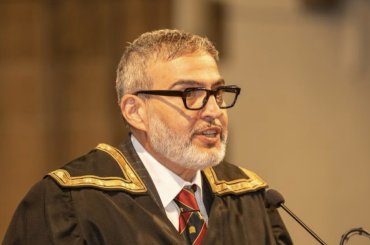With little fanfare, in late 2019 Tel Aviv University shuttered its Tami Steinmetz Center for Peace Research. Two other peace groups – both mostly manned by former Israeli generals and secret policemen – were also closed. Yours truly thinks this is actually good news, and not just because of a slight allergy to former generals. (Or, for that matter, former first lieutenants.)
“Peace” was often a cover phrase, which may well have served to doom normal life in Israel and Palestine. The famous and mythical Israeli quest for “peace”, though responsible for some quite good music, was a chimera.
Assuming the problem of Israel-Palestine is a problem of “peace” required several assumptions:
- There is some sort of parity between Israel and the Palestinians.
- Both sides were engaged in war, or war-like activities.
- What was needed was a Palestinian leader who would be conciliatory enough to agree to peace.
None of these assumptions were true. Oh, certainly there were hostilities galore, chief of them the Israeli invasion of Lebanon in 1982. We bombed Palestinians where we could find them, and were quite ingenious in killing them in various ways. The Palestinian armed groups were as murderous as the IDF, though spectacularly less successful. Israel was never – not even in the horror days of 2001-2002 – facing a military enemy in the Palestinians. There was never a war. War requires some sort of parity. There were Israeli-Egyptian wars, but not an Israeli-Palestinian one.
What we faced was an insurrection. The difference is critical. In war, two sides face one another in battle, often for made-up reasons. Insurrections are different. One side is putting its boot on the other side’s neck. The second side tries to take it off. Often we are speaking of enslavers and those who are enslaved. Each side knows the other intimately, and the fight is fueled by the projection of those carrying out the injustice. Think, for instance, of the Israeli paranoia that THEY “want to throw us into the sea”, while at the same time denying furiously anything unusual happened here in 1947-1948.
The 1982 war’s major goal was to wipe out the PLO as a viable Palestinian national movement. The goal, in fact, was to make the Israeli occupation of the West Bank and the Gaza Strip easier. Break the PLO in Lebanon, thought Ariel Sharon, and you’ll break its ability to serve a national movement. Then it would be easy to atomize the occupied Palestinians, and force down their throat some Bantustan agreement.
The first part actually worked.
That glorious of all Palestinian struggles, the First Intifada, was a true people’s insurrection. It was led from below, by group leaders who lost much of their faith in the “outside” PLO – Arafat and his sycophants in Tunis, a revolutionary force unique in becoming corrupted before it reached power. The local groups played a very delicate game: They couldn’t disown the PLO, because its ideas were popular. So they gave lip-service to Arafat, and on the ground played a rather different game. They refused to turn the struggle into an armed one, because an armed struggle requires specialists, fighters, and you couldn’t run a viable guerrilla campaign in the Gaza Strip and in the West Bank. Far more importantly, they quietly turned the Palestinian struggle on its head. The “outside” PLO was fighting, ostensibly, for diaspora Palestinians; the Intifada shifted the focus to the needs of the Palestinians living under occupation.
And these rebels managed to drag Israel to the table. Fighting an insurrection was eroding the fighting abilities of the IDF, swallowing huge amounts of its manpower, and Rabin – an old-time general – wanted out. So he spoke about “peace”, by which he meant an end to daily IDF activities in the West Bank. (Arafat immediately acted to remove the local rebel group leaders from any positions of authority, but that’s another story.)
But the problem remained: Not hostilities, but the occupation. With a dreadful irony, the occupation became tighter after the Oslo Accords. Rabin’s goal was not peace but separation: “We here, and they over there”, as he said in his 1992 campaign. It was after Oslo that the West Bank became Balkanized; that Palestinians needed permits to move from one part of the West Bank to another, a special permit to enter Jerusalem from the West Bank, and a permit to enter Israel. And, of course, a permit to travel from the West Bank to Gaza. Rabin was blunt about what he wanted: “[An occupation] without the HCJ and B’Tselem.” Arafat’s numerous secret police services were meant to outsource the occupation to the Palestinian Authority. He said it openly, but Israelis didn’t listen. Everyone, after all, was speaking of “peace.”
What we needed, what we still need, is not peace. There cannot be peace between a slave holder and the people they enslave. They will be, by nature, mortal enemies. What we need is justice. An end to the secret conflict, to the night raids, to house demolitions, to tortured children, to the secret police atomizing Palestinian society. Jewish Israelis need to start seeing Palestinians as human beings deprived of their basic rights, not as militants being any sort of threat to the IDF. They never were. The phrases of war and peace, of endless “negotiations” and “peace process” never mentioned justice, just de-escalation as Israel deepened its hold on the occupied territories.
And, of course, we’ll need to talk about 1948. This will not be easy to Jewish Israelis, but we won’t get anywhere without it. And we cannot bring it up if we keep speaking of peace instead of justice. So let the old organizations dismantle; we’d do better without the anesthetic phrases which always come with a covered bundles of “security arrangements” devised by generals.



My view is the opposite: if we can’t have both peace and justice , if we have to choose one or the other – I choose peace.
Our focus should be on finding a reasonable political agreement to ensure a peaceful future for our children and grandchildren, free of bloodshed and violence and not on chasing some mirage of ultimate “justice”.
Various Israeli think tanks – Commanders For Israel’s Security, The Institute For National Security Studies, to name two – envision the future as a kind of apartheid-lite, a soft-ish occupation, Bantustans with wi-fi. If you look at their position papers actual negotiations with the Palestinians is not in the cards, instead they envision some kind of “separation” but with all Palestinian land, airspace, and movement controlled by Israel.
Very good, Gurvitz, thank you. Finally a realistic appraisal of the PA and Oslo.
I hope you realize, though, that no part of justice allows continued occupation of anywhere in Palestine by the Zionists or their offspring, in the absence of a general Palestinian plebiscite — without occupation or otherwise duress.
I’m afraid I agree with Yossi Gurwitz. The peace camp, such as it is, is mostly “soft Zionists,” who are still Zionists.
I’m reminded of the woman who saw my “Jews Against the Occupation,” asked me what it was about, and finally said, “Why can’t they just get along?” I said, “Because the Jews want all of the land with none of the people.” That would be peace. And that’s what most Zionists, I think, mean by peace.
Yes indeed: Israel invaded Lebanon in 1982 to facilitate its occupation of the West Bank and Gaza (and the Golan Heights).